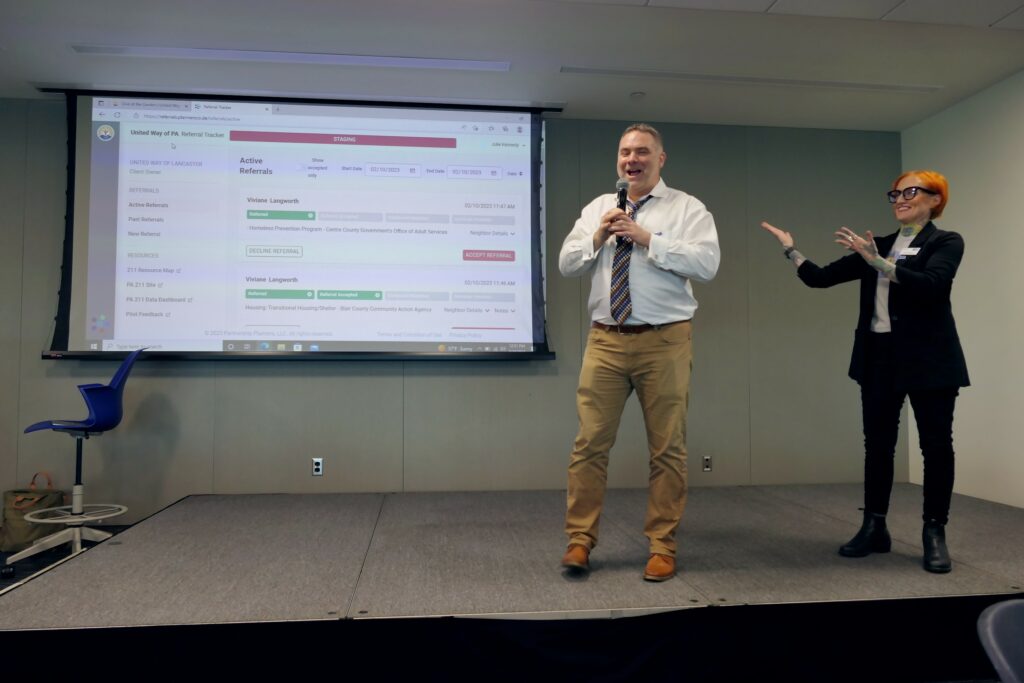Friday’s 211 Day Summit marked the public debut of an enhanced IT platform for 211 referrals that United Way of Lancaster County hopes to expand first regionally and eventually statewide.
Deveoped by Harrisburg-based Partnership Planners, it is accessible from both desktop platforms and mobile devices such as cell phones.
Crucially, it is a “closed loop system.” What does that mean? Partnership Planners President Chad Frey and United Way Director of Community Initiatives Julie Kennedy explained and provided the summit audience a demonstration.
When a neighbor — Kennedy prefers the word to alternatives like “client” — calls 211 needing, say, food assistance, a 211 staffer will make a referral, to a food bank or to SNAP, most likely, and document the interaction. But unless the neighbor or food bank calls back, there’s no way to know if the connection was made. Maybe the neighbor lost the number, or the line was busy, or there was another complication.
With a closed-loop system, the framework for documenting that connection is built in. A referral triggers an alert that goes to the provider. The provider can log in to document attempts to contact the neighbor. When an intake appointment is made, that’s recorded, completing the sequence.

The data is centralized, but access is decentralized, Frey said. Service providers can make “peer-to-peer” referrals to each other. Neighbors can log in to check the status of their cases. A robust set of access levels and permissions ensures that sensitive data is protected and users see only the information they should.
The system is designed to be interoperable with other provider databases and referral systems, Frey said. It uses an API, application programming interface, to pull in external information, reducing the need for manual updates. Providers can log in to update their data, too.
Over the past year or so, the platform has gone through several rounds of beta testing with a select handful of nonprofits. They run the gamut from large organizations with state-of-the-art capabilities to shoestring organizations that use pen, paper and a spreadsheet, Frey said.
The High Foundation has provided $160,000 toward developing the system, and just pledged an additional $80,000, local United Way President & CEO Kevin Ressler said. Meanwhile, U.S. Sen. Casey, D-Pa. secured $670,000 in federal funding late last year to further the project.
The system remains in beta, Ressler said, but beginning now, any Lancaster County nonprofit interested in taking part is welcome to do so. In Lebanon County, a pilot version is just getting under way, and United Way is seeking a half dozen or so early adopters there.
In the medium term, United Way plans to adopt the system throughout the seven-county PA 211 East service area. The ultimate goal is to make closed loop platforms available statewide — and ensure they can communicate with each other, Frey said.
He and Kennedy stressed that the system is designed to put the individual first. It’s stressful and traumatizing to have to keep telling your story over and over again, Kennedy said: Limiting repetition and providing efficient access to service will be a big help. It also will bolster morale among 211 staff, who will be able to see that, yes, the neighbors they served did indeed make the connection they were seeking.
Keith Cromwell, director of Penn Medicine Lancaster General Health’s Health Information Exchange program, asked how the initiative relates to PA Navigate, a similar system being proposed statewide by the Pennsylvania Department of Human Services. It was previously known as RISE PA, “RISE” being short for “Resources Information and Services Enterprise.”
Partnership Planners’ platform looks similar, Cromwell said, expressing concern over “duplicative services.”
It’s fine to have multiple options out there, as long as they’re interoperative, Frey said: “You can’t have enough people doing this work.”
Ressler said he doesn’t want to bide his time and isn’t convinced that government or other organizations have the commitment to bring their versions across the finish line any time soon. The need, he said, is immediate and urgent.
“We’ve been able to find resources to start doing it,” he said. “We’re going to do it.”






